Essential oils and sleep
- 15 June 2020
- Joanna Rusling
Essential Oils and Sleep
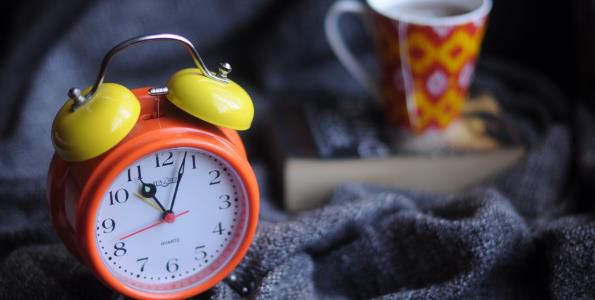
Sleep is essential to our survival and so it’s no wonder that without it, we struggle to function. We’re living in a fast-paced and demanding period of time, where many of us have lost touch with the most basic needs of the body and the messages our bodies are sending us.
As we emerge from lock-down and the threat of the COVID-19 pandemic across the world, where we were forced to slow down. Those of us who worked from home or juggled homeschooling discovered an extra hour or two in the morning that was once reserved for the daily commute or getting children off to school. Without the beeping alarm and early starts, you would expect we experienced better sleep for longer periods. Yet so many people, myself included struggled with sleep?
There are several reasons and lots of contributing factors. Today I want to talk to you about the importance of sleep and the options I’ve tried and tested to achieve good quality, restful periods, of deep sleep.
Sleep can simply be described as ‘repair’. It’s one of the best ways to rest, rejuvenate, reset, and restore ourselves.
Sleep has been a real passion of mine, as I have suffered from insomnia for large periods at different times of my life. Lack of sleep seriously impacts your overall health and has personally been a major contributor to my own mental health.
For centuries essential oils have been used to promote good sleep. They calm and soothe and alleviate stress to contribute to good quality sleep. They are potent, powerful and a fast acting tool to achieving a state of relaxation and calm.
Emotions and behaviour, our tolerance levels and our joy are all affected by lack of sleep. It’s much more difficult to enjoy life when you’re chronically sleep deprived. Our cognitive ability becomes impaired, and all aspects of our life including our relationships can become affected.
Sleep deprivation can make you become more accident-prone and will affect your ability to heal, as it slows down your metabolism and your body's capacity to remove waste from your system.
The amount of sleep we need varies from person to person. Most healthy adults can survive on 7-8 hours of sleep per night, although many will get by on anything more than 5 hours. Ultimately, we should aim to consistently achieve up to 9 hours of sleep each night.
Melatonin is our sleep hormone and this is secreted from our Pineal Gland. This regulates our sleep/wake cycle and influences our Hypothalamus.
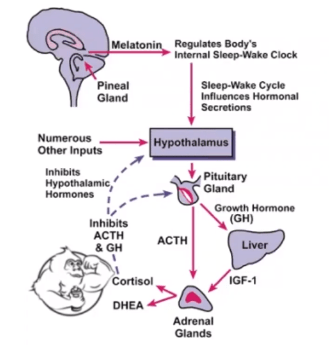
This sends the messaging to our pituitary glands to secrete the hormones that affect our adrenal glands and Cortisol production. We need Cortisol to survive and it’s an essential element of our sleep patterns.
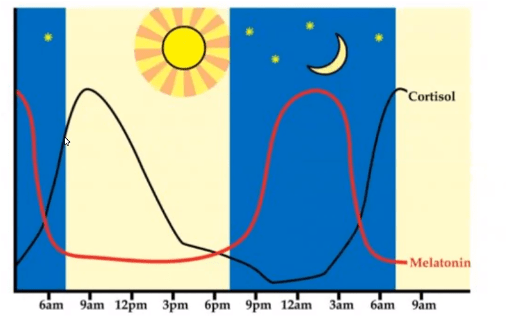
As our Cortisol levels drop (around 10pm) we should be feeling sleepy and begin drifting into a deep sleep as our Melatonin rises (around 2am).
Quality sleep happens in stages, and we enter light transitional sleep (known as Stage 1) as we start to dose off. We enter Stage 2 of sleep as the chemicals produced in the brain block the senses making it difficult to be woken. As we drift into Stage 3 of a deep sleep, growth hormone is released and our bodies begin to rejuvenate. As we pass into the final stage, known as the REM stage (Rapid Eye Movement), we can experience intense dreaming as the memory is revitalised and our brain activity increases.
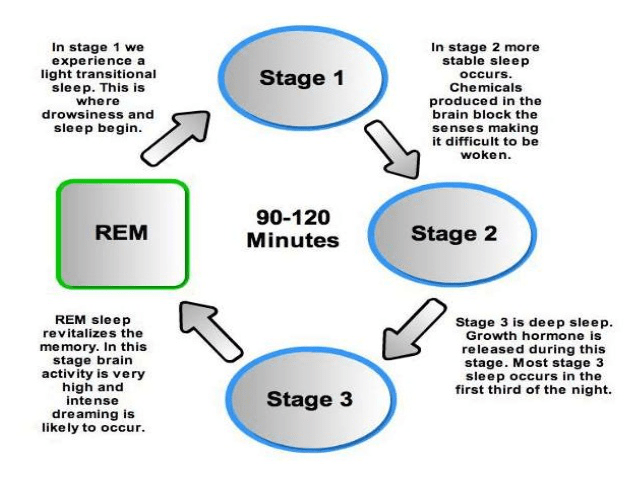
Looking at the human body in a 24 hour period, our body really does work in cycles, and becomes very efficient with a regular routine. Our habits and routines literally determine the level at which our cells can function.
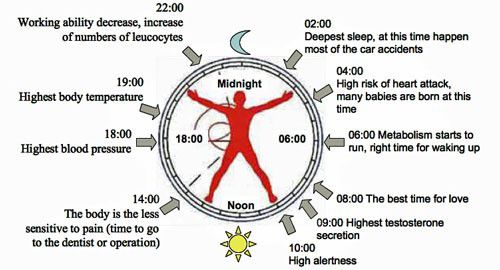
Traditional Chinese Medicine believes in ideal harmonizing habits. By doing this routinely, you’ll find you begin to experience predictable habits and health benefits. Regular bowel habits, clear thought, and being generally more productive throughout your day. These patterns in turn, will contribute to good quality stage 3 periods of sleep.
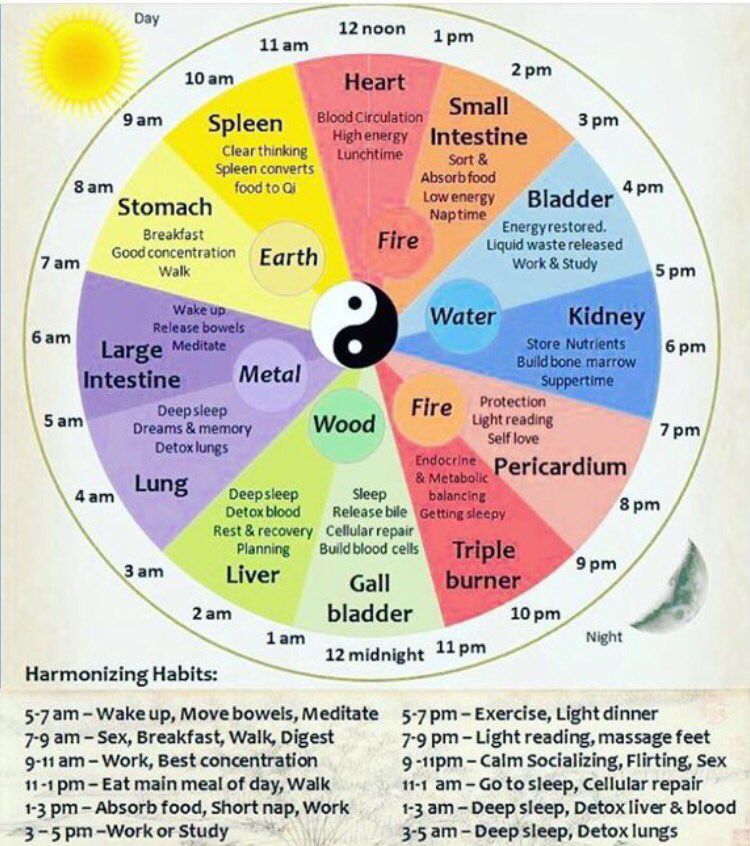
I have personally found meditation to be a highly beneficial way of achieving homeostasis (balance). I used Holosync binaural beat meditation when I suffered from insomnia. I now know that chronic stress, leaky gut, heavy metal toxicity, poor habits, all colluded and impacted my ability to make serotonin and melatonin. A functional gut microbiome is necessary for producing the key building blocks we need to make our bodywork. It’s little wonder depression and sleep issues are intertwined, the same key building blocks as required for these processes to occur. Binaural beat meditation helped the brain to slow into the deeper frequency levels to imitate stage 3 sleep. I also take dōTERRA’s ‘Life Long Vitality’ vitamins to help support my body with foundational vitamins and minerals in a bioavailable form my body can easily use as building blocks. When you have chronic health issues and low energy production due to toxicity you need to assist digestion as much as possible, we use a lot of energy to digest our food. A lack of appetite is a sign of high cortisol, adrenal stress, we don’t feel like eating when we are in flight, fright or freeze!
Rhythm is incredibly important for humans. Our brains recognise patterns, and our organs and bodily functions respond accordingly. Our sleep health, mental health, and general wellbeing rely on a pattern of wake time and rest time. Natural sunlight is imperative to our entire system and humans have used dusk and dawn to determine sleep patterns since the beginning of time.
With human advancement has come artificial light. Street lights, television screens, devices etc.. This is a big issue for sleep health as artificial light interrupts our day/night pattern and blue light from devices is known to be interrupting our melatonin hormone pathways. Aside from the addiction issues we all know about, the long term side-effects to our health are still unknown and with unconfirmed links to macular degeneration, cancer, and other diseases we should be limiting our exposure as much as possible. My suggestion is to keep these devices out of your bedroom entirely. Do not have your phone next to your head connected to the outside world all night. The incidence of brain tumour on the side of the head used to speak on mobile devices and in the pelvis for those carrying devices in their pant pockets is staggering.
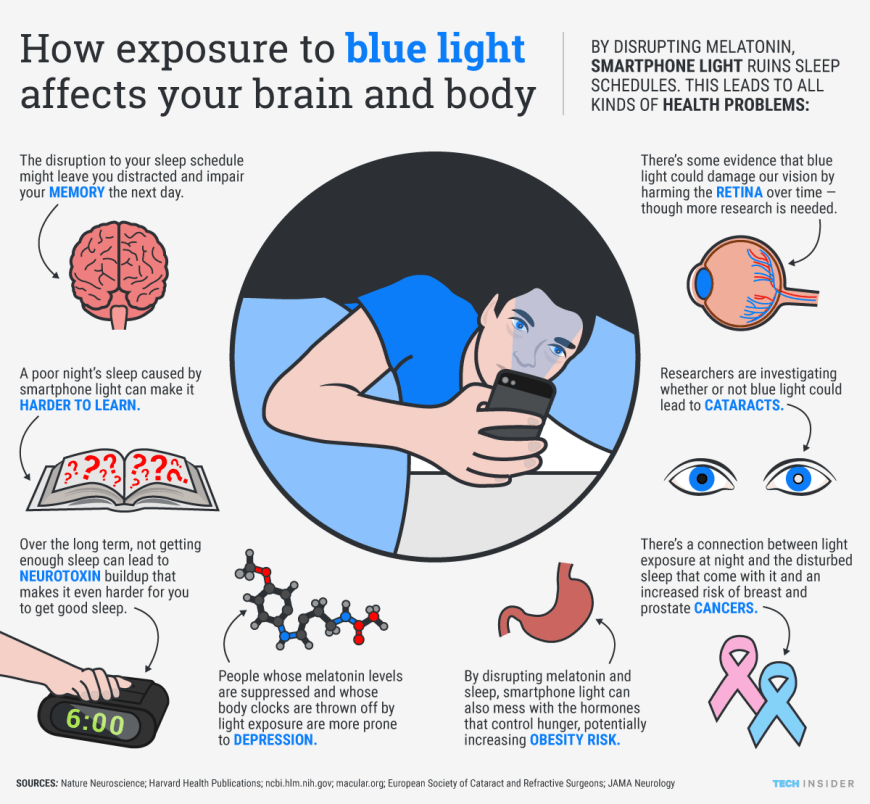
If you’re experiencing difficulty falling asleep or suffering from disturbed and broken sleep, there are several ways to help achieve a restful state to give your body and brain the best opportunity to drift off:
Healthy diet
Try Keto, low processed sugar, lots of vegetables, small amounts of meat
Good sleeping environment
Clean and comfortable bedding, good airflow, good temperature
Avoid stimulants
Have you tried going without caffeine, cocoa, or chocolate for a few days? You might feel terrible, and wonder why you’re feeling sluggish or grumpy. You’re detoxing! Try going without for a week, and see if the effects on your sleep
Exercise regularly
We need natural sunlight, fresh air, and movement to keep our internal organs and our brains functioning well. Lack of walking and standing up is the “new smoking threat” as our lymphatic system is designed to moved lymph (our immune system) by walking. This is why standing desks have become popular, sitting for long periods is bad for us.
Remove distractions
No phones, laptops, or other distractions in your bedroom. Try reading a book, or listening to some soothing music or a meditation track.
Reset your internal clock
If you’re trying to re-adjust your sleep patterns, you’ll need to wake up earlier rather than going to bed earlier as sleep adjustment occurs from the time you wake rather than the time you fall asleep.
Relaxation
Hot shower or a dose of Tryptophan in a glass of milk.
Essential oils
Try diffusing oils which promote restful sleep, such as Lavender, dōTERRA Easy Air®, dōTERRA Lavender Peace®, Cedarwood, Frankincense.
My personal favourite combination at the moment is Vetiver, Ylang Ylang and Lavender.
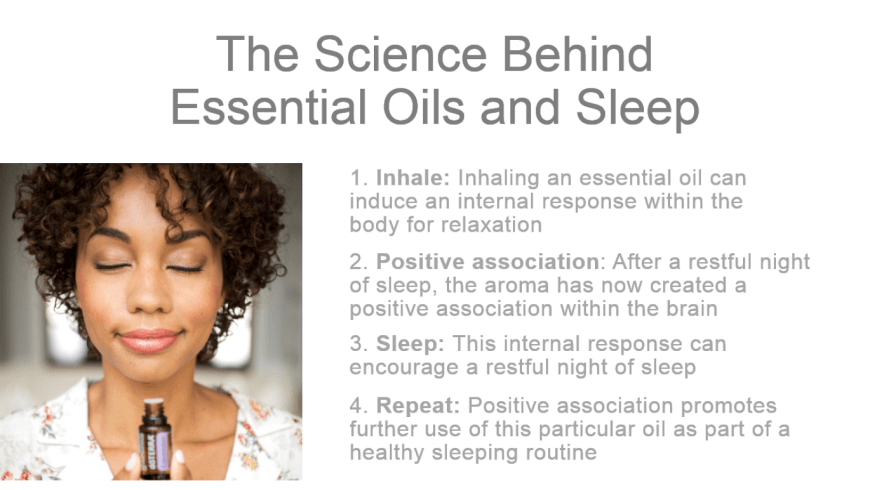
Essential oils can be used in several ways to assist with your bedtime routine:
Diffusion
Try these blends before going to bed to help relaxation and to set a sleep mood for your brain to recognise
- 3 drops of Sandalwood, 3 drops of Vetiver, 3 drops of Lavender, 2 drops of Roman Chamomile
- 4 drops of Lavender, 3 drops of Bergamot, 2 drops of Patchouli, 2 drops of Ylang Ylang
- There’s no need to have your diffuser going for several hours. The volatile aromatic compounds are very light and they hang in the air for several hours. Always have a door open and allow adequate ventilation.
Warm bath or shower
Add a few drops of a calming oil to a warm bath before bed. Add the oils to Epsom Salt and pour into the bath.
If you don’t have access to a bath, you can apply a few drops to a washcloth or some bath salts and have it on the floor of the shower. The aroma will rise with the steam.
Try adding a few drops to your shampoo or conditioner.
Pillows and Bedding, use a spritzer blend
Add a few drops of a calming essential oil to a spray bottle and mix with a few ounces of water, add a pinch of salt to help mix. Shake thoroughly, use the spray bottle to spritz the mixture over your pillows and bedding before going to sleep to create a restful environment.
- Lavender and Cedarwood
- Bergamot and Vetiver
- Sandalwood and Ylang Ylang
Heating pad or neck wrap
It’s easy to make your own heat pack at home. You’ll need a kitchen tea towel, sewing machine, 6 cups of flaxseed , buckwheat or rice and your chosen essential oil.
Fold the towel in half, long ways and sew around the edges leaving a small opening at the top. Turn it the ride side out and loosely fill with flaxseeds, buckwheat, or rice, and then sew the opening closed.
Heat the pack in the microwave for 2 minutes and add a few drops of your favourite oil to the outer fabric.
Topical application and massage
Apply your essential oil to:
- Bottoms of the feet
- Neck and shoulders
- Temples
- Wrists
- Massage shoulders, arms, back, legs, feet
- dōTERRA Balance oil promotes whole-body relaxation and feelings of tranquility
- dōTERRA Breathe is a respiratory blend that helps to maintain a feeling of clean airways
- dōTERRA Lavender Peace (Serenity) is a restful blend to assist with tension, calms emotions, soothes the senses.
Tea
Try non-caffeinated and non-stimulatory teas such as:
- Chamomile, Lavender, Honey and Lemon
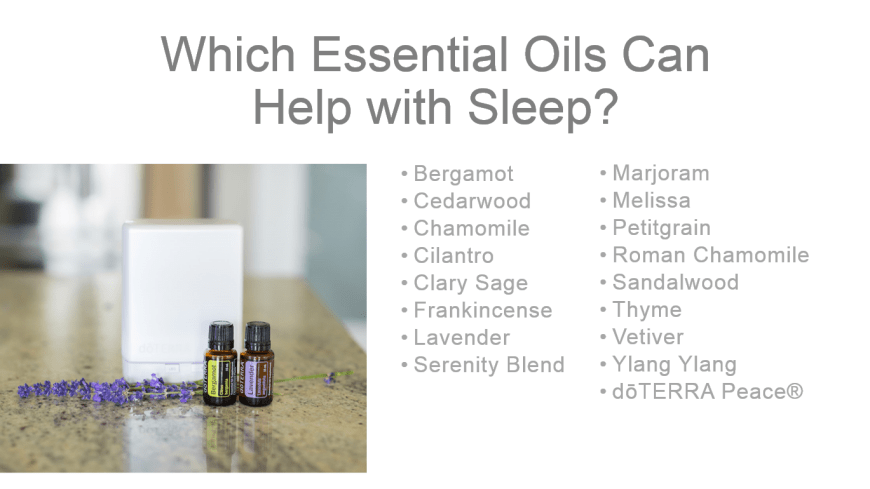
I have personally discovered the all-round benefits of good quality sleep, and have tried every possible remedy and therapy to achieve a solid 8 hours each night. During this time of uncertainty it is easy to be affected by stress and have your cortisol – melatonin balance impacted affecting sleep. Be gentle on yourself and take anything non-essential off your schedule, ease yourself back into “normal” life. The mass sell out of toilet paper shows us how we all collectively had our survival instincts impacted. Many people found they put on weight and struggled with maintaining a daily routine, not realising how impacted we have all been by worldwide events.
By sharing these tried and tested methods, I believe quality sleep can be achieved and you too and enjoy the energy, vitality, and mental health that comes with being the best version of you.
You can watch my webinar Essential Oils and Sleep (link coming soon), and if you’re interested in essential oils and the AromaTouch technique to assist with your sleep patterns, please reach out as I’d love to connect with you.
Joanna xo
Header Image Credit: Photo by Sanah Suvarna on Unsplash
